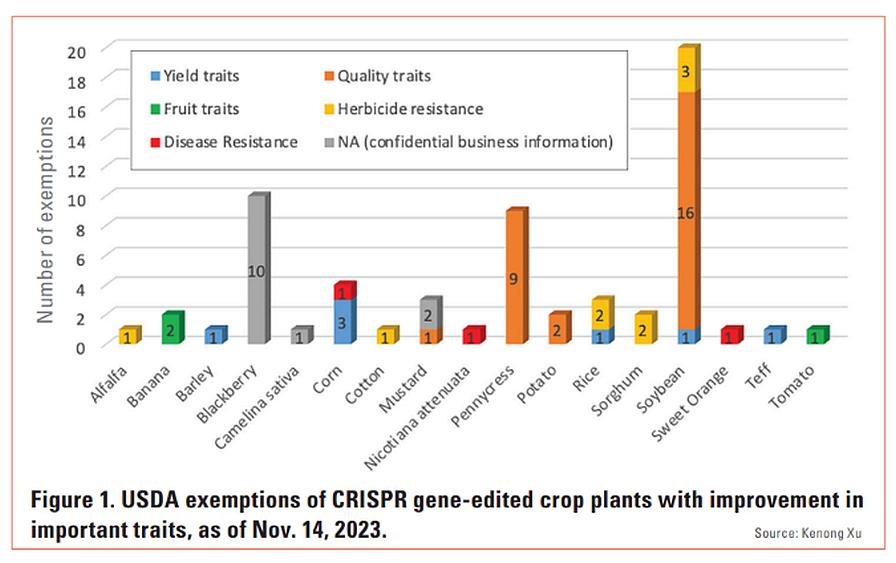Latest Breakthrough on USDA Exemption of Gene-Edited Crops
The development of CRISPR (clustered regularly interspaced palindromic repeat) gene-editing technology has been truly a breakthrough for both medical and plant biotechnologies. Multiple news agencies recently reported that U.K. regulators have approved Exa-cel, the first CRISPR gene-editing treatment for a disease (sickle cell disease, a devastating blood disorder) in humans. Exa-cel was co-developed by Vertex Pharmaceuticals and CRISPR Therapeutics. At press time, it was expected the U.S. FDA would approve Exa-cel as soon as December 2023.
In plants, CRISPR-based gene editing has been adapted rapidly and widely for crop genetic improvement due to its programmable and precise nature in editing genomic DNA sequences in living plant cells.
More importantly, CRISPR gene-edited crop plants can end up free of any exogenous DNA. This means CRISPR-caused genetic changes are indistinguishable from the genetic changes created by conventional plant-breeding techniques, such as sexual hybridization and mutation by chemical and physical agents.
In response to such scientific and technological advances associated with CRISPR, USDA has exempted various CRISPR gene-edited crop plants from federal regulations (7 CFR part 340) designed for conventional genetic modifications.
WHAT PLANTS ARE EXEMPT?
Following is a brief update on which CRISPR gene-edited crop plants have been exempted thus far, what plant traits were altered for improvement, and what types of entities are currently developing.
Gene-edited crop plants exempted by USDA from regulations to date: Based on information available online, USDA Animal and Plant Health Inspection Service has confirmed at least 63 exemptions for crop plants that were edited using CRISPR during the three-year period from 2021 through 2023. Overall, these exemptions cover 17 crop plant species (Figure 1).
The three crop plants with the most exemptions are soybean (20), blackberry (10) and pennycress (9), which account for 62% (39/63) of the total exemptions.

For fruit crops, a sum of 14 exemptions were given, including two for banana, 10 for blackberry, and one each for sweet orange and tomato.
Efforts for commercial production of these gene-edited crops are underway. For example, Pairwise Plant Services, Inc., a North Carolina start-up specializing in improving crop plants using the CRISPR technology, has recently launched its first gene-edited plant product (a leafy mustard green of improved taste and nutritional values), dubbed ‘Conscious Greens’.
CRISPR-improved plant traits: Although a description for traits altered was not available in 13 of the 63 exemptions due to confidential business information (Figure 1), a number of important traits that were improved through CRISPR gene editing in the 17 crop species still could be noticed in the 50 exemptions.
For example, these traits were grouped into five categories, including yield traits (with seven exemptions), quality traits (28), fruit traits (three), herbicide resistance (nine), and disease resistance (three) (Figure 1).
Since 31 of the 50 exemptions were about alteration in quality and fruit-related traits, crop quality improvement clearly has been the most important goal in these plant gene-editing efforts.
Going forward, CRISPR gene editing will be deployed continuously to enhance crop productivity, quality, and resistance to biotic and abiotic stresses, as well as to address new challenges facing crop production in the foreseeable future.
The developers: There are 16 entities responsible for developing these USDA-exempted gene-edited crop plants, of which 12 were private companies, two were public institutions, one was a nonprofit organization, and another was a private college.
Twelve of the 16 developers are located in the U.S. The remainder include two in the U.K., one in Germany, and one in South Korea. This indicates that U.S. companies are the major developers of these gene-edited crop plants that have been exempted by USDA to date.
CRISPR-based gene editing technology has been used successfully by U.S. companies and other private and public institutions to improve diverse crop species. The current focus of improvement has been largely on crop and fruit quality. Holistically, CRISPR gene-edited plants are expected to be a major contributor to plant-based food production, including fruits.










